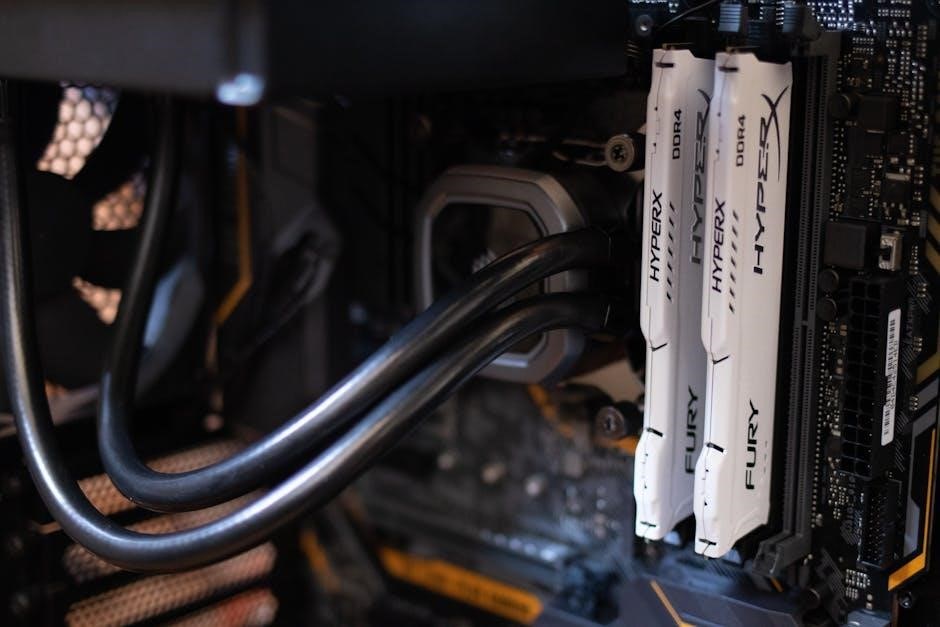The Grokking System Design Interview course offers a comprehensive‚ step-by-step approach to mastering system design interviews‚ focusing on critical thinking and problem-solving skills. It covers scalability‚ distributed systems‚ and cloud services‚ providing practical insights and real-world applications to help candidates excel in technical roles.
Overview of the Grokking System Design Interview Course
The Grokking System Design Interview course is a structured‚ step-by-step guide designed to help candidates master the fundamentals of system design interviews. It focuses on critical thinking‚ problem-solving‚ and scalability‚ providing in-depth insights into distributed systems‚ load balancing‚ caching‚ and database selection. The course emphasizes practical applications‚ with real-world examples and case studies to illustrate key concepts. It also covers cloud services and resource optimization‚ offering strategies to design systems that adapt to fluctuating demands. Additionally‚ the course includes mock interviews and feedback mechanisms to simulate real interview scenarios‚ helping participants refine their approach. By addressing non-functional requirements and security considerations‚ the course equips learners with a holistic understanding of system design‚ making it a valuable resource for technical interview preparation.
Importance of System Design Interviews in Tech Roles
System design interviews are pivotal in evaluating candidates for technical roles‚ as they assess the ability to design complex systems‚ think critically‚ and solve problems under uncertainty. These interviews reflect real-world challenges‚ such as scalability‚ distributed systems‚ and resource optimization‚ which are critical for building robust and efficient software solutions. By demonstrating technical depth and the ability to justify design choices‚ candidates showcase their readiness for senior roles. The process also evaluates how well one can handle non-functional requirements‚ security considerations‚ and fluctuating demands‚ ensuring they can contribute to large-scale projects effectively. Acing system design interviews signifies mastery of both theoretical and practical aspects of system architecture‚ making them indispensable for career advancement in tech.

Understanding the Structure of System Design Interviews
System design interviews involve discussing problem statements‚ designing architectures‚ and explaining trade-offs. Candidates are evaluated based on their thought process and technical skills‚ ensuring comprehensive assessment.
Key Components of a System Design Interview
A system design interview typically involves several key components‚ including understanding the problem statement‚ designing a high-level architecture‚ and explaining trade-offs. Candidates are expected to demonstrate their ability to think critically and solve problems creatively. The process often includes discussing scalability‚ load balancing‚ and caching strategies‚ as well as selecting appropriate databases and cloud services. Interviewers also assess how well candidates handle uncertainty and communicate their design decisions clearly. Additionally‚ candidates may be asked to estimate system requirements‚ such as latency and throughput‚ and justify their choices. The ability to adapt designs based on user questions and constraints is crucial. By breaking down these components‚ the Grokking System Design Interview PDF provides a structured approach to mastering each aspect of the interview process.
Common Problem Statements and Expectations
Common problem statements in system design interviews often revolve around designing scalable distributed systems‚ such as a social media platform or an e-commerce backend. Candidates are typically asked to outline the architecture‚ considering factors like user growth‚ data storage‚ and network latency. Expectations include the ability to break down complex problems into manageable components‚ justify design choices‚ and discuss trade-offs. Interviewers also look for understanding of non-functional requirements‚ such as security and availability. The Grokking System Design Interview PDF highlights these common scenarios and provides guidance on how to approach them systematically. By practicing these problem statements‚ candidates can build confidence and improve their ability to think critically under pressure during real interviews.

Core Concepts in System Design
Core concepts include scalability‚ distributed systems‚ load balancing‚ caching‚ and database selection. These fundamentals are crucial for designing efficient‚ high-performance systems‚ as emphasized in the Grokking System Design Interview PDF.
Scalability and Distributed Systems Fundamentals
Scalability and distributed systems are cornerstone concepts in system design‚ focusing on building systems that handle increasing workloads efficiently. Scalability can be achieved through horizontal (adding more servers) or vertical (upgrading server power) scaling. Distributed systems involve multiple components working together‚ ensuring fault tolerance and high availability. Load balancing is critical to distribute traffic evenly‚ preventing bottlenecks. The CAP theorem guides trade-offs between consistency‚ availability‚ and partition tolerance in distributed systems. Understanding these fundamentals is vital for designing systems that scale gracefully and adapt to fluctuating demands‚ as emphasized in the Grokking System Design Interview PDF. These concepts form the foundation for tackling complex system design challenges in interviews.
Load Balancing‚ Caching‚ and Database Selection
Load balancing ensures efficient traffic distribution across servers‚ preventing bottlenecks and improving responsiveness. Techniques like Round-Robin and Least Connections are commonly used to optimize resource utilization. Caching mechanisms‚ such as CDN for static content and in-memory caching with Redis‚ reduce latency and improve system performance by minimizing repeated data fetches. Database selection is critical‚ with choices between relational databases (e.g.‚ MySQL) for structured data and NoSQL (e.g.‚ MongoDB) for unstructured‚ scalable datasets. Understanding these concepts is vital for designing high-performance systems‚ as highlighted in the Grokking System Design Interview PDF.
- Load balancing algorithms enhance system reliability and performance.
- Caching strategies optimize data retrieval and reduce server load.
- Database selection impacts scalability‚ consistency‚ and query efficiency.
Cloud Services and Resource Optimization
Cloud services play a pivotal role in modern system design‚ enabling scalability and cost efficiency. Candidates are expected to leverage platforms like AWS‚ Azure‚ and GCP to optimize resource utilization. Load balancing‚ auto-scaling‚ and serverless architectures are key strategies to handle fluctuating demands. Understanding how to right-size resources ensures minimal waste while maintaining performance. Cost optimization techniques‚ such as using spot instances or reserved capacity‚ are critical for budget-conscious designs. Additionally‚ monitoring tools like CloudWatch or Azure Monitor help track performance metrics and identify bottlenecks. The Grokking System Design Interview PDF emphasizes these concepts‚ highlighting their importance in building scalable‚ efficient‚ and cost-effective systems.
- Cloud platforms offer scalable infrastructure for dynamic workloads.
- Resource optimization balances performance and cost-effectiveness.
- Monitoring tools provide insights for continuous system improvement.

Preparing for the Interview
Preparing for the interview involves mock interviews‚ feedback mechanisms‚ and utilizing resources like the Grokking System Design Interview PDF to refine your approach and build confidence in your design skills.
Step-by-Step Approach to System Design
A systematic approach to system design involves understanding requirements‚ identifying key components‚ and designing scalable architecture. Begin by clarifying functional and non-functional needs‚ then break down the problem into manageable parts. Sketch a high-level design‚ focusing on scalability‚ distribution‚ and fault tolerance. Evaluate trade-offs‚ such as consistency vs. availability‚ and choose appropriate technologies like load balancers‚ caches‚ and databases. Consider cloud services for resource optimization and ensure security measures are integrated. Use back-of-the-envelope calculations to estimate resource needs and validate your design under expected and extreme conditions. Iterate based on feedback and refine your solution. This structured method ensures comprehensive coverage of all aspects‚ helping you build robust and efficient systems effectively.
Mock Interviews and Feedback Mechanisms
Mock interviews are a vital preparation tool for system design interviews‚ allowing candidates to simulate real-world scenarios and refine their problem-solving skills. These sessions provide practical experience in articulating design decisions‚ estimating resource requirements‚ and addressing non-functional constraints. Feedback mechanisms play a crucial role in identifying weaknesses and improving communication clarity. By participating in mock interviews‚ candidates can practice explaining complex systems in a structured manner‚ ensuring they cover all critical aspects of the design process. This iterative approach helps build confidence and adaptability‚ enabling candidates to handle unexpected challenges during actual interviews effectively. Regular feedback loops ensure continuous improvement‚ making mock interviews an indispensable part of a successful system design interview preparation strategy.
Resources for Effective Preparation
Effective preparation for system design interviews requires access to high-quality resources. The “Grokking System Design Interview” course stands out as a comprehensive guide‚ offering step-by-step approaches to complex problems. Additionally‚ resources like “System Design Interview Textbook” provide detailed insights into designing scalable systems. Online platforms offer interactive coding challenges and mock interviews to simulate real-world scenarios. Blogs and forums dedicated to system design share valuable tips and case studies‚ helping candidates understand industry expectations. Leveraging these resources enables candidates to deepen their technical knowledge‚ refine their problem-solving skills‚ and build confidence in articulating their designs. By combining theoretical learning with practical exercises‚ aspirants can systematically improve their readiness for system design interviews.

Advanced Topics in System Design
Advanced system design involves handling uncertainty‚ designing for non-functional requirements‚ and integrating security considerations. These topics require deeper technical insight and practical application of design principles.
Handling Uncertainty and Critical Thinking
Handling uncertainty and developing critical thinking are essential skills in system design interviews. Candidates must navigate ambiguous problem statements‚ identify unknowns‚ and make reasonable assumptions. Critical thinking involves evaluating trade-offs between scalability‚ latency‚ and cost. Interviewers expect candidates to articulate their thought process clearly‚ demonstrating how they prioritize and iterate on designs. The ability to adapt designs based on evolving requirements and constraints is also crucial. By practicing mock interviews and reviewing feedback‚ candidates can refine their approach to uncertainty and improve their decision-making under pressure. These skills are vital for designing robust‚ scalable systems in real-world scenarios‚ where uncertainty is inherent and critical thinking drives effective solutions.
Designing for Non-Functional Requirements
Designing for non-functional requirements is crucial in system design interviews‚ focusing on aspects like scalability‚ availability‚ and security. Candidates must consider how systems handle fluctuating demands‚ ensuring optimal resource utilization. Key areas include authentication‚ authorization‚ and data protection. Grokking resources provide practical examples and guidelines for addressing these requirements. Interviewers expect clear articulation of trade-offs and justifications for design choices. Understanding how to implement non-functional requirements effectively ensures robust and scalable system designs‚ aligning with real-world challenges and expectations in tech roles.

Security Considerations in System Design
Security is a critical aspect of system design‚ requiring meticulous planning and implementation. Candidates must integrate encryption‚ authentication‚ and authorization at every stage of the design process. Data protection measures‚ such as secure data transmission and storage‚ are essential to prevent breaches. Interviewers assess the ability to identify vulnerabilities and mitigate risks effectively. Grokking resources emphasize the importance of security best practices and compliance with industry standards. By prioritizing security‚ designers ensure trust and integrity in their systems‚ meeting the high expectations of modern tech roles and real-world applications.

Case Studies and Real-World Applications
Grokking System Design Interview provides practical examples and case studies‚ applying theoretical concepts to real-world problems‚ enhancing problem-solving skills‚ and demonstrating scalable system design in action effectively.
Designing a Scalable Distributed Backend
Designing a scalable distributed backend involves understanding load balancing‚ caching‚ and database selection. The course provides practical examples‚ such as building a high-traffic e-commerce platform‚ to demonstrate how to optimize resource utilization and ensure fault tolerance. Students learn to evaluate trade-offs between relational and NoSQL databases‚ implement microservices architecture‚ and leverage cloud services for cost efficiency. Real-world case studies from the course illustrate how to handle fluctuating demands and scale systems gracefully. These examples emphasize the importance of balancing performance‚ availability‚ and maintainability‚ equipping candidates with the skills to tackle complex system design challenges effectively in interviews. The course’s structured approach ensures comprehensive coverage of distributed systems fundamentals‚ preparing candidates for technical roles in leading companies.
Practical Examples from the Course
The Grokking System Design Interview course provides numerous practical examples to illustrate key concepts. For instance‚ students learn how to design a scalable URL shortening service‚ a distributed chat application‚ and a high-throughput e-commerce platform. These examples cover critical aspects such as load balancing‚ caching strategies‚ and database selection. The course also includes real-world case studies‚ such as designing a scalable backend for a social media platform‚ to demonstrate how to handle millions of users and requests. By working through these examples‚ candidates gain hands-on experience in translating theoretical knowledge into actionable solutions. These practical exercises are designed to simulate real interview scenarios‚ helping candidates build confidence and proficiency in system design. The course’s focus on practical application ensures that learners are well-prepared to tackle complex problems during actual interviews.
Lessons Learned from Successful Designs

Successful system designs emphasize scalability‚ adaptability‚ and robustness. A key lesson is to prioritize understanding the problem deeply before diving into solutions. Breaking down complex systems into manageable components is crucial. Load balancing and caching strategies are vital for handling high traffic and improving performance. Distributed systems require careful consideration of consistency and availability trade-offs. Security should be integrated at every layer‚ from authentication to data encryption. Real-world examples‚ like designing a scalable backend for social media‚ highlight the importance of anticipating future growth. Iterative refinement and continuous optimization are essential for maintaining system health. These lessons underscore the value of practical experience and critical thinking in system design‚ preparing candidates to tackle real-world challenges effectively. By learning from successful designs‚ interviewees can develop a systematic approach to solving complex problems. This expertise is invaluable in both interviews and professional roles.






